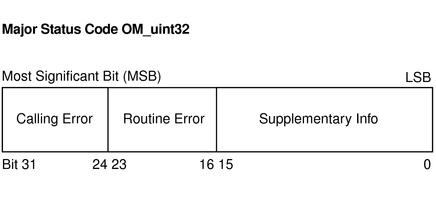| Skip Navigation Links | |
| Exit Print View | |

|
Developer's Guide to Oracle Solaris 11 Security Oracle Solaris 11 Information Library |
| Skip Navigation Links | |
| Exit Print View | |

|
Developer's Guide to Oracle Solaris 11 Security Oracle Solaris 11 Information Library |
1. Oracle Solaris Security for Developers (Overview)
2. Developing Privileged Applications
3. Writing PAM Applications and Services
4. Writing Applications That Use GSS-API
7. Writing Applications That Use SASL
8. Introduction to the Oracle Solaris Cryptographic Framework
9. Writing User-Level Cryptographic Applications and Providers
10. Introduction to the Oracle Solaris Key Management Framework
A. Sample C-Based GSS-API Programs
Functions From Previous Versions of GSS-API
Functions for Manipulating OIDs
Address Types for Channel Bindings
Implementation-Specific Features in GSS-API
Oracle Solaris-Specific Functions
Implementations of Selected Data Types
Deletion of Contexts and Stored Data
Protection of Channel-Binding Information
Context Exportation and Interprocess Tokens
Types of Credentials Supported
Wrap Size Limits and QOP Values
Messages Returned in Kerberos v5 for Status Code 1
Messages Returned in Kerberos v5 for Status Code 2
Messages Returned in Kerberos v5 for Status Code 3
Messages Returned in Kerberos v5 for Status Code 4
Messages Returned in Kerberos v5 for Status Code 5
Messages Returned in Kerberos v5 for Status Code 6
Messages Returned in Kerberos v5 for Status Code 7
Major status codes are encoded in the OM_uint32 as shown in the following figure.
Figure B-1 Major-Status Encoding

If a GSS-API routine returns a GSS status code whose upper 16 bits contain a nonzero value, the call has failed. If the calling error field is nonzero, the application's call of the routine was erroneous. The calling errors are listed in Table B-1. If the routine error field is nonzero, the routine failed because of a routine-specific error, as listed in Table B-2. The bits in the supplementary information field of the status code can be set whether the upper 16 bits indicate a failure or a success. The meaning of individual bits is listed in Table B-3.
The following tables list the calling errors that are returned by GSS-API. These errors are specific to a particular language-binding, which is C in this case.
Table B-1 GSS-API Calling Errors
|
The following table lists the GSS-API routine errors, generic errors that are returned by GSS-API functions.
Table B-2 GSS-API Routine Errors
|
The name GSS_S_COMPLETE, which is a zero value, indicates an absence of any API errors or supplementary information bits.
The following table lists the supplementary information values returned by GSS-API functions.
Table B-3 GSS-API Supplementary Information Codes
|
For more on status codes, see GSS-API Status Codes.
The function gss_display_status() translates GSS-API status codes into text format. This format allows the codes to be displayed to a user or put in a text log. gss_display_status() only displays one status code at a time, and some functions can return multiple status conditions. Accordingly, gss_display_status() should be called as part of a loop. When gss_display_status() indicates a non-zero status code, another status code is available for the function to fetch.
Example B-1 Displaying Status Codes with gss_display_status()
OM_uint32 message_context;
OM_uint32 status_code;
OM_uint32 maj_status;
OM_uint32 min_status;
gss_buffer_desc status_string;
...
message_context = 0;
do {
maj_status = gss_display_status(
&min_status,
status_code,
GSS_C_GSS_CODE,
GSS_C_NO_OID,
&message_context,
&status_string);
fprintf(stderr, "%.*s\n", \
(int)status_string.length, \
(char *)status_string.value);
gss_release_buffer(&min_status, &status_string,);
} while (message_context != 0);
The macros, GSS_CALLING_ERROR(), GSS_ROUTINE_ERROR() and GSS_SUPPLEMENTARY_INFO(), take a GSS status code. These macros remove all information except for the relevant field. For example, the GSS_ROUTINE_ERROR() can be applied to a status code to remove the calling errors and supplementary information fields. This operation leaves the routine errors field only. The values delivered by these macros can be directly compared with a GSS_S_xxx symbol of the appropriate type. The macro GSS_ERROR() returns a non-zero value if a status code indicates a calling or routine error, and a zero value otherwise. All macros that are defined by GSS-API evaluate the arguments exactly once.